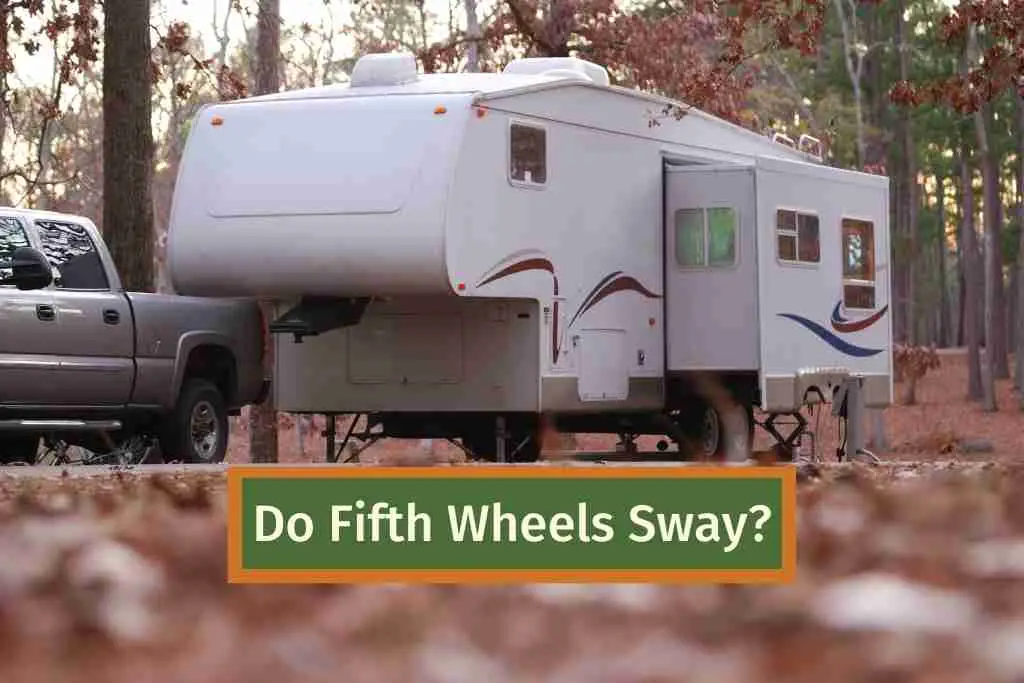Fifth-wheel hitches are a common choice for hauling large trailers, like campers. But are they more likely to sway than other hitches?
Fifth-wheel trailers are typically more stable than other trailers. However, several factors can cause them to sway and tip over. These include weather, driver error, not balancing the load, and not ensuring the hitch is aligned correctly.
So how can you make your fifth wheel more stable? What makes fifth wheels more stable than other types of trailers? Read on to find out!
Why Do Fifth Wheel Trailers Sway and Roll Over?
Fifth-wheel hitches are usually a very stable choice for larger trailers like campers or those used by semi-trucks. However, even though they are more stable, they come with risks. Certain conditions can cause these trailers to sway and fall over.
Wind And Weather
Wind and weather can definitely affect the stability of your fifth wheel. Campers can be especially susceptible due to their high center of gravity. This high center of gravity can also make the trailer more like to flip over on wet or wintery roads.
Fifth-wheel campers can also be prone to blowing over. This is because of their height and their construction. Campers are often made of lightweight materials to make them more efficient. But be aware that some high winds can catch your trailer like a sail and blow it away!
Driver Error
Unfortunately, driver error is a common cause of fifth-wheel accidents. Typically those hauling fifth-wheel campers may not use fifth wheels frequently. This lack of experience from the driver can make them more likely to cause an accident.
You should also be more aware of other drivers on the road. They may not understand that fifth wheels need more space to maneuver or slow down. You should take the time to anticipate how other drivers may behave and how to respond while towing a fifth-wheel trailer.
Unbalanced Trailer
Incorrectly loading the trailer is another common cause of a fifth-wheel rollover. If the trailer’s weight is not correctly balanced, it is more likely to roll over when making sharp turns. Properly balancing a trailer ensures it can handle the change in force when turning.
Not Performing A Pre-Trip Inspection
Before taking off on the road, you should perform a pre-trip inspection of your vehicle and trailer. That includes inspecting the fifth wheel plate and kingpin. You should adjust them so the trailer sits level when attached to your vehicle.
You should also check to ensure that your tires are in good order. If one was to go flat or blow out, it could cause the trailer to flip over.
Is A 5th Wheel More Stable?
A fifth wheel is more stable than a bumper pull. Fifth wheels have a better connection and are typically hauled with larger vehicles. The fifth wheel plate also moves the center of gravity further forward onto the rear axle of the towing vehicle. This creates more stability.
Depending on what you’re hauling a fifth wheel may be more stable than gooseneck trailer. Fifth wheel plates are typically used when towing campers because they create a smoother ride for the cargo. They also have a variety of weight capacity options.
Unfortunately, even though fifth wheels are more stable than other trailer types, they can still be involved in accidents. You should always be aware of road and weather conditions. Be sure to also keep an eye on other drivers. How you respond to them could make your situation better or worse!
How Do I Stabilize My Fifth Wheel?
Ultimately, the stability of your fifth wheel depends on several factors.
- Ensure your trailer is properly balanced. This means there shouldn’t be too much weight on the tongue or on the rear of the trailer. You should also make sure the kingpin and plate are at the correct height so the trailer sits level when connected to the towing vehicle.
- Monitor weather conditions and learn how to respond to them accordingly. Weather will not only affect your visibility and response to your surroundings. It can also affect your vehicles ability to stop the momentum of the trailer as well as blow the trailer over.
- Learn how to properly drive with a large trailer attached. Start with a smaller trailer first before upgrading to a fifth wheel until you’re more experienced. Driving with a larger trailer greatly changes how your vehicle will turn, stop, and accelerate. So be sure to practice!
- Follow your state’s Department of Transportation regulations for hauling trailers that are large enough to need a fifth wheel attachment.
It’s important that you follow all of the items on this list. That way you aren’t just protecting yourself, but also other drivers on the road. Missing one or two of the things on this list will increase the likelihood of having an accident. Be safe out there!
Final Thoughts
Many people think that fifth wheels sway a lot, but the truth is that they don’t. Fifth wheels are actually pretty stable when traveling down the road. However, some Fifth Wheels do have more wiggle room than others, so if you’re looking for a tight travel experience, then a Fifth Wheel with less wiggle room may be better for you.


